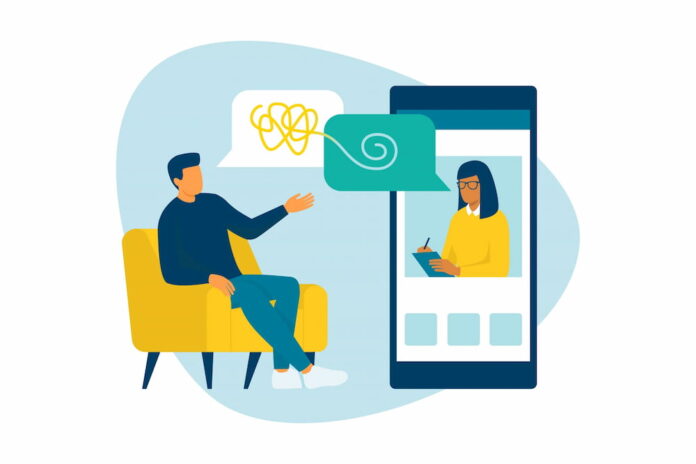Good mental health helps you enjoy life and deal effectively with its challenges.Without mental wellness, you may be unable to realise your full potential and play an active part in affairs of day to day life.
That said, a mental disorder is nothing to be ashamed of. It should be treated as a medical condition just like any other disease,those that are completely curable and individuals with such issues have been known to live normal lives for many years thereafter.
Role of Mental Health Apps
Mental health applications are easily accessible to those suffering from any mental ailment and offer an excellent solution, especially to people who are unable to attend in-person treatment.
App developers should therefore aim to provide a safe and secure place to the patients from where they can access treatment, not only anonymously but at a lower cost.
Furthermore, developers should strive to provide a haven to the user by following the regulatory guidelines for their apps which are a critical aspect of development of the app.
In other words, encryptions, HIPAA compliance or GDPR privacy standards should form an integral part of mental health app development.
Benefits and Limitations of Mental Health Apps
Since more than half the traffic on the web comprises mobile users, it makes it easy for businesses to offer applications to their users for accessing mental health services.
This, in turn,allows the health care provider to conveniently check and track the progress of the mental health issue of their patients as well as reducing the workload of the psychiatrists and therapists since the apps can help them handle multiple queries at the same time.
Health care professionals and facilities that use smartphone app services can handle emergency cases more efficiently, speed up the treatment procedure which can turn out to be a lifesaver in a crisis situation.
Encouragement to adopt a healthy lifestyle, easier communication, improved appointment scheduling and counseling are some other key benefits of mental health apps.
While these signs are encouraging, there are potential barriers and challenges to the widespread use of mobile health applications.
Even though more and more people are turning to mental health apps to access their services, there is very little data available about the current state of the app market.
Apart from this issue the information provided by the health care apps can vary from app to app. Since different apps use different methods to analyse data,the accuracy of data can become a cause for concern.
Internet accessibility,high cost of a smartphone and lack of regulatory approval are other key factors limiting the penetration of mobile health apps in the market and hampering their demand.
What Special Services Can Health Smartphone Apps Offer Patients?
The ever increasing adoption of mobile health technology is unprecedented in the history of medicine. Every month researchers and companies release new smartphone apps for the healthcare market.
Digital trends reveal that an increasing number of patients are turning to their smartphones more than ever before not only for health advice but to keep a track of their overall fitness levels as well.
A tailor-made healthcare application can be designed to cater to the individual need of the patient, offer a personalized treatment experience by taking in account each individual’s unique medical history and preferences.
Mobile healthcare applications can allow patients to access their treatment plans, medical records and educational resources in order to promote active engagement in their journey towards better health.
Using mental health apps patients can easily manage and track their health records, monitor progress,set timely reminders for medicine and receive feedback from their health care professionals.
Mental Health Apps for Specific Conditions
Those seeking mental health support today, have the option to choose between six types of smartphone health care products.
All the apps listed below differ in use. While some offer symptom and mood monitoring others provide exercise and lessons while some target therapeutic modalities and psychiatric ailments.
A) Platforms designed to offer online therapy intervention for specific mental disorder conditions like autism, anxiety, depression and others.These apps are often used in conjunction with guidance from a health care provider.
Ex: Ayana Therapy, BetterHelp, Talkspace and more.
B) Apps that offer mindfulness training and meditation practices for the overall well-being of the user by increasing focus and calm.
Ex: Headspace,Calm,Insight Timer
C) Some apps function like a platform for licensed mental health professionals to conduct sessions in therapy with their clients. These apps can be useful for both individuals and whole organizations as well.
Ex: Mindgram, MyChart, VisualD
D ) Apps that offer relaxation provide their users with a variety of meditation themes like relaxing music and other ways to help you feel relaxed throughout the day. Themes include bird songs,nature sounds and white noises like wind,rain and fire.
Ex: Relax,4 Relax,Ten Percent Happier etc
E) Apps for mood tracking cannot diagnose mental health issues,the mood-tracking tools can help monitor your mood and give you a good insight on the stresses that trigger such negative thoughts and emotions.
Ex: Moodfit,Worry Watch,MoodTools etc
F) Apps for breathing exercises help to keep thoughts organized and calm our busy minds with short but guided breathing sessions. These apps are an excellent aid,both for new users and experienced enthusiasts also.
Ex: Exhale,Aura,Unplug etc.
Wrapping it up
Mental health apps can provide tools to regulate the different aspects of wellness like, anxiety,depression,mood,sleep etc,but in no way can replace a real-time doctor.
However, they can come in handy to connect users with a licensed health care provider, check for symptoms and get advice on the next step forward.
Read Also
- Why the Keto Diet Works for Some People—and Fails Dramatically for Others: An Ayurvedic Breakdown for Modern HealthcareThe keto diet has dominated weight-loss culture for years. For some people, it produces rapid fat loss, stable energy, and improved mental clarity. For others—especially those who gain weight easily—it leads to burnout, digestive distress, rebound weight gain, high cholesterol, and a metabolism that feels slower than before. Healthcare often frames this as a discipline… Read more: Why the Keto Diet Works for Some People—and Fails Dramatically for Others: An Ayurvedic Breakdown for Modern Healthcare
- How to Choose the Best Assisted Living Facility for SeniorsAre you looking for the right assisted living facility for a senior loved one? Choosing a place can feel overwhelming. There are many factors to consider, from care services to the environment. Safety, comfort, and social opportunities play important roles in daily life. Each senior has unique needs and preferences that must be met. Understanding… Read more: How to Choose the Best Assisted Living Facility for Seniors
- Burn Smart, Not Hard; Shape Burn: Clean Protein for Weight ManagementYou want to feel light, strong, and confident. You don’t want crash diets or fake promises. You need a plan that works with your body, not against it. That’s where Shape Burn comes in. You can burn fat without losing strength. You can eat better and stay full. You can manage weight in a way… Read more: Burn Smart, Not Hard; Shape Burn: Clean Protein for Weight Management
- Creatine Basics: How Much Is 5g, How Much Water You Need, and Whether Pills or Powder Work BetterIf you’ve ever walked into a supplement aisle or scrolled through fitness TikTok, you’ve probably seen people talking about creatine — usually with a shaker bottle in hand and promises of better workouts and faster gains. And honestly? They’re not wrong. Creatine is one of the most researched and effective supplements for muscle strength, recovery,… Read more: Creatine Basics: How Much Is 5g, How Much Water You Need, and Whether Pills or Powder Work Better
- Understanding Breast Cancer in Men: Key Facts and SymptomsBreast cancer is often thought of as a disease that only affects women. However, men can develop it too. Although it is less common, early detection and awareness are important. Read on to learn key facts, symptoms, and ways men can take action to protect their health. How Common Is Breast Cancer in Men? Breast… Read more: Understanding Breast Cancer in Men: Key Facts and Symptoms






